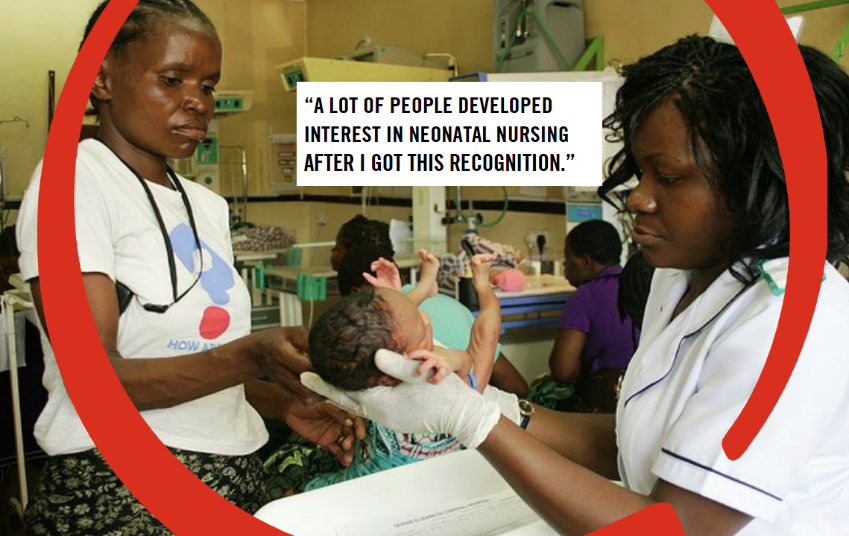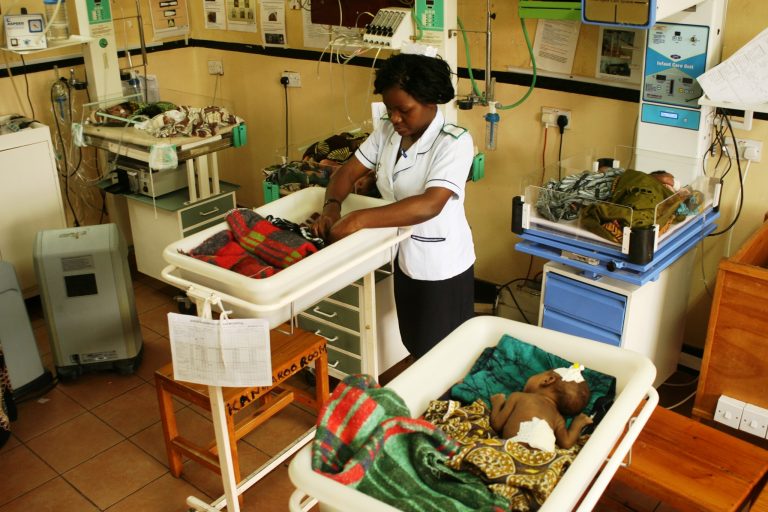When she was recognized as an outstanding neonatal nurse in 2013, Netsayi Chimenya Gowero says, “The award changed my life.” At just 22 years old, she was the nursing in-charge of the neonatal unit at Queen Elizabeth Central Hospital in Blantyre, Malawi. Her peers nominated her for the prestigious Council on International Neonatal Nurses Excellence Award, which recognizes nurses who specialize in newborn care in resource-challenged settings. As the runner up, she traveled to Northern Ireland and made a public commitment to call attention to the shortage of neonatal nurses in settings like Malawi.
She has kept her word.
After returning to Malawi, Netsayi won another award, “best neonatal nurse in Malawi,” which former Minister of Health Dr. Jean Kalilani presented to her. The minister called upon all nurses to follow in Netsayi’s footsteps: to be both hardworking and dedicated to making a difference. Netsayi was also selected to represent Malawi in the Young African Leadership Initiative for Southern Africa with other young leaders from various fields in southern Africa. “A lot of people developed interest in neonatal nursing after I got this recognition,” she says.

For example, the University of Malawi’s Kamuzi College of Nursing involved Netsayi in teaching students in the clinical area. Then the school’s vice principal encouraged her to apply for the master’s program in pediatric health with specialization in neonatal nursing. Netsayi was accepted to the highly competitive program and will complete her two-year degree in December 2016.
Her master’s thesis is on increasing parental involvement in neonatal care, particularly around pain management. Netsayi notes that most hospitals in Malawi have limited pain medication for infants, so she’s looking at some non-pharmacological pain-relieving strategies mothers can offer such as breastfeeding, swaddling the infant, or practicing kangaroo care to comfort and reduce the stress on the baby.
Netsayi has noticed increased interest in neonatal nursing, in part as a result of the attention she has helped draw to the profession. “There are now a lot of young, vibrant nurses in my unit, and I am mentoring them,” she said. She says mentoring is critically important to both learning and maintaining neonatal nursing skills. “When students first come to the ward they need supervision, so they know how to do things competently in the clinical area. Yes, we train them on how to deliver the best care possible for excellent outcomes. But it’s more of a change of mindset we are seeking. We need to change the way we think and do things to improve patient care in our hospitals.”
With the increased interest in neonatal health has come new investments in the hospital. The neonatal care unit has more than doubled in size, to 85 beds – including more beds in the kangaroo care ward – and the equipment is being updated. “When the ward was smaller,” Gowero says, “it was hot and cramped. Nurses didn’t like to work there. We used to tell the mothers to leave after feeding the babies, but now they can stay for as long as they need.” The improved facility has contributed greatly to the improved morale, she adds.
About her future plans, Netsayi says, “I consider myself a frontrunner in neonatal nursing and am planning to continue my studies to a PhD in maternal and newborn health. I am hoping to influence policies in neonatal health as well as improve neonatal nursing practice.” She also plans to work with her peers to start Malawi’s first neonatal nursing professional association. “I know I will be a leader in that!”
